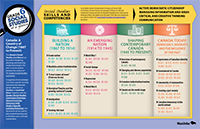_DOWN.png)
_DOWN.png)
_DOWN.png)
_DOWN.png)
_DOWN.png)
_DOWN.png)
_DOWN.png)
_DOWN.png)
_DOWN.png)
_DOWN.png)
_DOWN.png)
_DOWN.png)
_DOWN.png)

In Grade 6 students learn about the following four themes:
Building a Nation (1867 to 1914)
Canada from 1914 to 1945
Canada from 1945 to the Present
Canada Today: Democracy, Diversity and the Influence of the Past
Learning experiences help students to respect diversity and collaborate with others. Students formulate questions, conduct research, and draw conclusions based on information and evidence. They learn about the enduring importance of the past as they explore what it means to be a citizen in their community, Canada, and the world.
To find out more about what your child is learning, we encourage you to talk to the teacher. You may also find helpful information on the Curriculum Essentials posters, which are interactive PDFs, designed for teachers that provide an overview of the knowledge, processes, and skills for this subject area.

Grade 6 Social Studies Curriculum Essentials posters ( 413 KB)
413 KB)
The first page gives an overview of what your child will be learning, grouped into big ideas so that the curriculum is easier to understand. The letter and number codes correspond to the curriculum learning outcomes. The arrow at the top of the page highlights the skills and competencies, which are described in more detail on the third page. These should be integrated throughout the teaching and learning of social studies. The second page organizes the specific learning outcomes by the six general learning outcomes, along with a more detailed description of what your child will learn and the categories found on the provincial report cards regarding assessment.
You may also wish to refer to the Grades K-8 Social Studies - Manitoba Curriculum Framework of Outcomes.
Assessment in Social Studies is based on the themes and topics in the tab WHAT MY CHILD IS LEARNING. Your child’s progress will be reported under three areas of learning:
Activities to do with your children in the community
Visit art galleries, museums and historic sites. Here are just a few examples:
Participate in cultural events such as:
Make travel a learning experience.
If you have opportunities for family travel near or far, prepare in advance using maps, pictures, stories and other types of research. While travelling, explore local sites and culture, take pictures, talk or write about experiences, share observations and memories.
Activities to do with your children in the home
Talk to your children about current events, look at maps and globes, look at artwork from various times and places, share stories of family and community history, read historical fiction, watch historical films.
Suggested websites
Kayak, Canada’s History Magazine for Kids
The Canadian Encyclopedia
Historica Canada, Heritage Minutes
Kids’ Stop, Aboriginal Affairs and Northern Development
Canadian Museum of History (formerly of Canadian Museum of Civilization)
Atlas of Canada Maps from Natural Resources Canada
Kids’CBC parents zone
Canada, A People’s History (CBC history videos)
Library and Archives Canada
Learning Resources from Veterans Affairs Canada, Remembrance zone
Student resources of the Canadian War Museum
